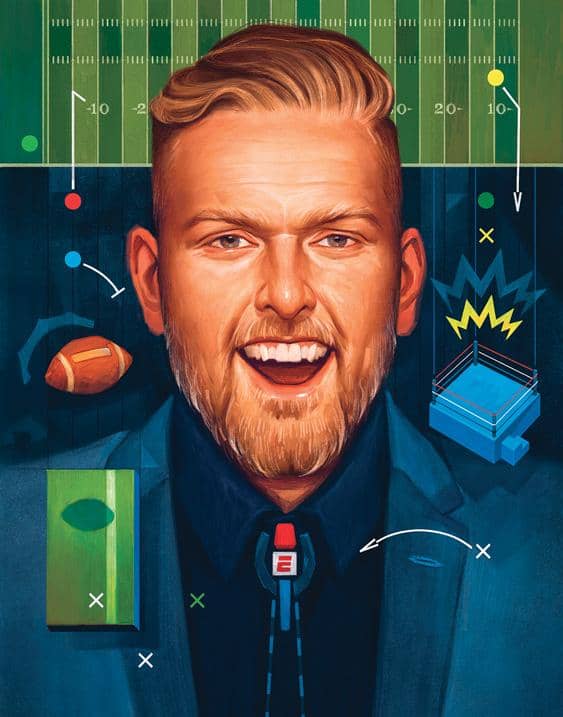
If, on a cool weekend morning in autumn, you happen to be watching “College GameDay,” on ESPN, don’t worry about figuring out which of the broadcasters behind the improbably long desk is Pat McAfee. He’s the one with the roast-pork tan, his hair cut high and tight, likely tieless among his more businesslike colleagues. The rest of the onair crew—Lee Corso, Rece Davis, Kirk Herbstreit, Desmond Howard, and, newly, the former University of Alabama coach Nick Saban—tend to look and dress and talk like participants in an old-school Republican-primary debate. McAfee, though, favors windowpane checks on his jackets and a slip of chest poking out from behind his two or three open buttons. If the others are politicians, he’s the cool-coded megachurch pastor who sometimes acts as their spiritual adviser.
This Saturday-morning getup—little brother gets sharp—counts as downright dressy for McAfee, who, in the course of the past few years, has become one of ESPN’s most visible sports-talking stars. In 2019, two years after retiring from the N.F.L., where he had been a punter for the Indianapolis Colts for eight years, he started his own program, “The Pat McAfee Show.” On the current version of the show—which he began licensing to ESPN last fall, and now runs for two hours every weekday afternoon—he typically wears only a tank top and a thin gold chain. It’s all about context: wherever McAfee appears, he’s always trying—he’s never effortless, that’s not his thing—to be underdressed by a few noticeable degrees. That style rule is symbolic of his broader meaning on sports TV. He’s there to loosen things up.
This story is from the September 23, 2024 edition of The New Yorker.
Start your 7-day Magzter GOLD free trial to access thousands of curated premium stories, and 9,000+ magazines and newspapers.
Already a subscriber ? Sign In
This story is from the September 23, 2024 edition of The New Yorker.
Start your 7-day Magzter GOLD free trial to access thousands of curated premium stories, and 9,000+ magazines and newspapers.
Already a subscriber? Sign In

HOLIDAY PUNCH
\"Cult of Love\" on. Broadway and \"No President\" at the Skirball.

THE ARCHIVIST
Belle da Costa Greene's hidden story.

OCCUPY PARADISE
How radical was John Milton?

CHAOS THEORY
What professional organizers know about our lives.

UP FROM URKEL
\"Family Matters\" and Jaleel White's legacy.

OUTSIDE MAN
How Brady Corbet turned artistic frustration into an American epic.

STIRRING STUFF
A secret history of risotto.

NOTE TO SELVES
The Sonoran Desert, which covers much of the southwestern United States, is a vast expanse of arid earth where cartoonish entities-roadrunners, tumbleweeds, telephone-pole-tall succulents make occasional appearances.

THE ORCHESTRA IS THE STAR
The Berlin Philharmonic doesn't need a domineering maestro.

HEAD CASE
Paul Valéry's ascetic modernism.